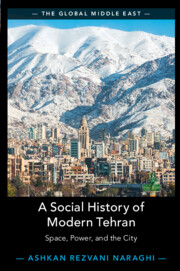Book contents
- A Social History of Modern Tehran
- The Global Middle East
- A Social History of Modern Tehran
- Copyright page
- Dedication
- Contents
- Figures
- Tables
- Foreword
- Preface
- Introduction
- 1 Segmented Society and the Social Production of Communal Spaces
- 2 Segmented Society and Spaces of Political Mobilization
- 3 Iranian Travelers and the Production of Spatial Knowledge
- 4 The Qajar Court and the City
- 5 The Interwar Period and Middle-Class Urbanism
- 6 The Age of Social Movements
- Conclusion
- Appendix Protest, Political Gatherings, and Parades between 1941 and 1953
- Bibliography
- Index
1 - Segmented Society and the Social Production of Communal Spaces
Published online by Cambridge University Press: 22 December 2022
- A Social History of Modern Tehran
- The Global Middle East
- A Social History of Modern Tehran
- Copyright page
- Dedication
- Contents
- Figures
- Tables
- Foreword
- Preface
- Introduction
- 1 Segmented Society and the Social Production of Communal Spaces
- 2 Segmented Society and Spaces of Political Mobilization
- 3 Iranian Travelers and the Production of Spatial Knowledge
- 4 The Qajar Court and the City
- 5 The Interwar Period and Middle-Class Urbanism
- 6 The Age of Social Movements
- Conclusion
- Appendix Protest, Political Gatherings, and Parades between 1941 and 1953
- Bibliography
- Index
Summary
My objective in this chapter is to investigate these questions through the examination of the relationship between society and the city in nineteenth-century Tehran. This relationship focuses on the spatiality of ordinary people’s daily lives. Social theories of space have become a common domain for geographers, sociologists, anthropologists, and ethnographers as a means to investigate socio-spatial processes. In this chapter, I unfold this theoretical framework and explain the impact of the spatial approach on social and historical examinations of cities before presenting the main empirical analysis of daily life and social spaces in nineteenth-century Tehran. My objective is to socialize the spatial analysis and, more importantly, to spatialize the social analysis. This chapter focuses on the relationship between urban society and Tehran in the nineteenth century. It examines people’s everyday lives in the city and their religious and non-religious spatial practices. It investigates various social spaces of day-to-day interactions in the city. I start by presenting a social analysis of Iranian urban society in the nineteenth century. Afterwards, I examine social spaces in two main categories: spaces based on religious gatherings and spaces based on nonreligious practices. This chapter ends with the examination of women’s social life and spaces in the city.
- Type
- Chapter
- Information
- A Social History of Modern TehranSpace, Power, and the City, pp. 13 - 67Publisher: Cambridge University PressPrint publication year: 2023

